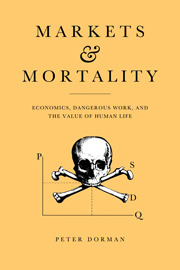Book contents
- Frontmatter
- Contents
- Preface
- Prologue
- 1 The economics of risk and the risk of economics
- 2 The theory of compensating wage differentials
- 3 Putting a value on human life
- 4 The real world of occupational safety and health
- 5 Alternative theories of risk, wages, and the labor market
- 6 New policies to promote safety and equity in the workplace
- Epilogue
- Notes
- References
- Index
4 - The real world of occupational safety and health
Published online by Cambridge University Press: 04 May 2010
- Frontmatter
- Contents
- Preface
- Prologue
- 1 The economics of risk and the risk of economics
- 2 The theory of compensating wage differentials
- 3 Putting a value on human life
- 4 The real world of occupational safety and health
- 5 Alternative theories of risk, wages, and the labor market
- 6 New policies to promote safety and equity in the workplace
- Epilogue
- Notes
- References
- Index
Summary
One of my favorite cartoons, by Kliban, shows a frumpy-looking professor standing in front of a class. He is pointing to the blackboard, which is filled with inscrutable equations bearing Greek letters and various mathematical symbols. There are many alphas, but on each is drawn eyes, a mouth, and fins. Before him are rows and rows of fish sitting at their desks, busily taking notes. The cartoon is entitled, “Proving the Existence of Fish.”
The idea that we could learn more about ourselves by studying our own and other societies is, in the western world, as old as Aristotle. Economics is ostensibly part of this grand project, yet all too often economists narrow their vision to only those ideas or observations that can be quantified or at least be represented mathematically. There is nothing wrong with theoretical and statistical analysis, of course, but slavish adherence to them fails to recognize that most of our collective experience with economic problems is too complex, qualitatively nuanced, and subjective to be captured by the techniques of formalization. Economists, like Kliban's professor, often ignore facts that are right in front of their noses. The consequence, however, may be worse than mere redundant frivolity; refusing to look beyond the blackboard can lead to the twin problems (analogous to the statistician's Type I and Type II error) that economics may fail to identify generalizations that could be supported by this wider array of evidence or may fail to reject generalizations that would be refuted by it.
- Type
- Chapter
- Information
- Markets and MortalityEconomics, Dangerous Work, and the Value of Human Life, pp. 107 - 141Publisher: Cambridge University PressPrint publication year: 1996



